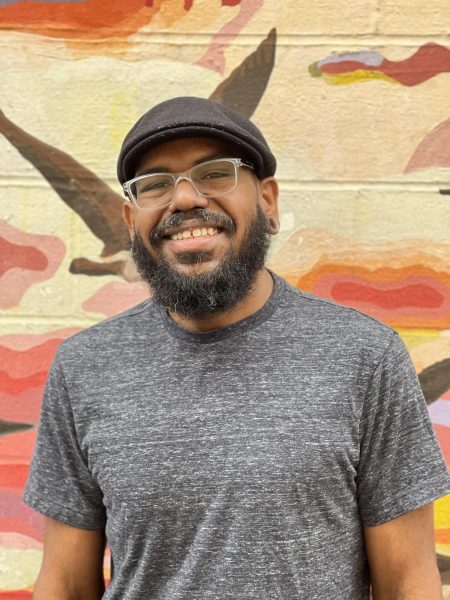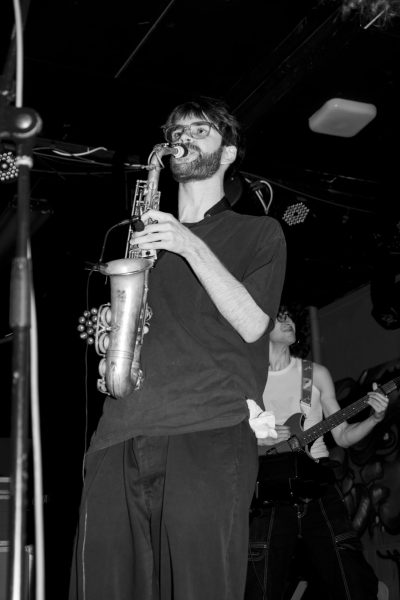Oberlin Crimson Collective Holds Second Roundtable Discussion
This Sunday from 2–4 p.m., the Oberlin Crimson Collective will host its second annual roundtable discussion titled “Our Community” in StudiOC. The Collective welcomes students from any major in the College or Conservatory and students of all gender identities to attend.
The Crimson Collective, officially the Oberlin Femininity in Black American Music Collective, is a student organization that centers the voices of gender minorities who perform Black American Music both in the Oberlin Jazz department and in the professional world.
“Our mission is to make a safer space for gender minorities in Black American Music,” Conservatory second-year and Crimson Collective co-president and co-founder Gabi Allemana said. “That’s what this discussion is doing. It’s shining a light on what happens to us all the time and how we can change things so we can feel encouraged to stay in this industry.”
When referring to “jazz” as an idiom and industry, the Crimson Collective prefers to use the term Black American Music which encompasses ‘jazz’ and other music created by Black people in America.
“We use the term Black American Music instead of ‘jazz’ because the word ‘jazz’ has a racist history, and we feel that Black American Music honors the history of this music more appropriately without confining it,” Conservatory third-year and Crimson Collective co-president and co-founder Marley Howard said.
Last spring, Crimson organized a roundtable similar to the one scheduled for Sunday. Allemana emphasized the need for the roundtable tradition to continue annually as the dynamics within the Jazz department change.
“I think it’s important to keep the conversation going as people come in and out of the department,” Allemana said. “These issues don’t go away after one talk.”
Last year, Howard and Allemana presented personal statements describing their experiences as gender minorities in Black American Music performance spaces.
“It was honestly pretty nerve-wracking,” Allemana said. “We were making ourselves very vulnerable from the start. It was a really hard thing to do.”
Rather than putting the spotlight on gender minorities within the department — a spotlight with potentially traumatic repercussions — the Crimson board wants the roundtable to be more of a conversation.
“I think we want to emphasize that this year’s roundtable is all about hearing everyone’s ideas,” Allemana said. “Even if you’re not a gender minority, you’re not just indifferent, neutral, you’re part of the conversation.”
Howard also pointed out the significance of the roundtable as a medium of discussion.
“Everyone and anyone is encouraged to speak,” Howard said. “This is an opportunity for us to all sit down and for every single one of us to hear what each other are thinking, an opportunity that we don’t get anywhere else. We are in-person, and we have to look everyone in the eye. They’re not easy conversations, but I think they’re really necessary for us to grow as a community and as a department.”
While the discussion will mainly focus on experiences specifically within the Oberlin Jazz department, Howard, Allemana, and College Liaison of the Collective Olive Badrinath all commented on how the intended audience of this event extends outside of the Jazz department.
“I work a lot of jazz events at the Cat [in the Cream] and have not been treated well at times,” Badrinath said. “It’s hard to know people and then also be disrespected by those people or have them disrespect the space. … I think there are a lot of other people who are part of the Oberlin jazz community peripherally who help put on these shows, who keep people performing and playing music, and this roundtable is important for them too.”
This conversation also pertains to the wider Conservatory community, as issues of gender justice exist in musical spaces outside of the Jazz department.
“I think that even the problems we have in this community, the Oberlin ‘Jazz’ department, are pretty prominent in every other music field too,” Allemana said. “It might be a little different from what the classical department experience is because they have more of a gender diverse program, but these problems are everywhere.”
Howard also acknowledged that not all students who engage with Black American Music major in Jazz Studies and that this conversation still applies to them.
“I think if you care about this music — if you appreciate or perform Black American Music, you should be going,” Howard said.
Ultimately, the Crimson Collective roundtable is a learning opportunity. Through the discussion, the Collective hopes to educate the Oberlin Black American Music community about the reality of gendered power dynamics in the field and on how to improve the reality for gender minorities.
“We want everyone to leave with the tactics necessary to approach any situation involving gender in the ‘jazz’ world,” Allemana said. “This is just as important as your jazz music theory class. You have to learn how to interact with people in an equitable way.”



